Search the Special Collections and Archives Portal
Search Results

Denise Lutey oral history interview: transcript
Date
Archival Collection
Description
Oral history interview with Denise Lutey conducted by Barbara Tabach on February 27, 2018 for the Remembering 1 October Oral History Project. In this interview, University of Las Vegas, Nevada (UNLV) campus officer Denise Lutey gives an account on the night of the October 1, 2017 mass shooting in Las Vegas, Nevada. She discusses the campus security measures taken at UNLV in order to keep the campus secure and create a safe space for any survivors. She mentions the people who were involved in providing safety and resources for the survivors, including the officers and student workers. Officer Lutey also discusses the general campus response as well as the various resources offered to citizens to help them be prepared for an emergency situation, such as the Active Shooter Training provided on campus.
Text
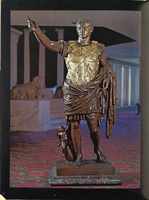
Hotel room brochure from Caesars Palace, circa 1969
Date
Archival Collection
Description
Bound booklet with concierge information for Caesars Palace. The guide provides entertainment and dining information about the resort and casino, including room service menus and a telephone directory.
Text
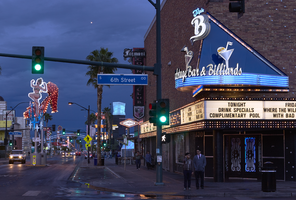
Photographs of Backstage Bar & Billiards, Las Vegas (Nev.), 2016-2017
Date
Archival Collection
Description
Site address: 601 Fremont St
Sign owner: DJ Lethal co-owned with DJ Scotty
Sign details: This building dates back to 1957. Triple B opened in 2012 as a billiard hall bar and concert venue. It is filled with a lot of Rock Memorabilia which includes a "turntable library" which they claim showcases over 8 decades of rock history. This location was furnished by rock outfitter Anvil Cases. This property got its name by being "backstage" to the adjoining Fremont Country Club.
Sign condition: 5- looks relatively new and still in great condition
Sign form: Variation of a Bull Nose Sign
Sign-specific description: Their entrance is on the corner of 6th (going South) and Fremont with a blue bull nose type sign in a triangle shape. The base of the triangle sign is right above the entrance. The triangle border has a blue (argon) strip with incandescents lining both sides of the neon tubing. At the base of the sign there is a blue (argon) curved platform (half circle placed adjoining to the base of the triangle). On this platform there are 5 separate strips of argon tubes. Above the platform states "Backstage Bar & Billiards" in white cursive channeled letters. Above the words Backstage and Billiards there are two martini glasses with a pool ball and flag in each glass. At the top of the triangle portion of the sign there is their logo "Triple B" in cursive with Triple in Blue and B in white. Below the bull nose sign there is a reader board that wraps around the building. This reader board is also lined with incandescent light bulbs. In the middle of the of the reader board there is a black background rectangle with 3 rhombus's lined in incandescent light bulbs in a design.
Sign - type of display: Neon, incandescent and reader board
Sign - media: Steel and Plastic
Sign - non-neon treatments: Reader Board
Sign animation: Flasher for incandescent light bulbs
Sign environment: Fremont East district East District, next to other bars and restaurants. This location is right across the street from the El Cortez. Also they claim to be "backstage" to the adjoining Fremont Country Club which inspired their name.
Sign manufacturer: Ultra Signs' recently bought out by Jones Las Vegas ( of Jones SIgns) who did not have records of this sign.
Sign - date of installation: 2012 when the bar opened
Sign - thematic influences: On Fremont many of the entrances are at the corner intersections, so the bull nose sign has been prominent design type to draw attention to the entrance of the company. This is remnant of the Golden Nugget and Binion's Horseshoe put up their bull nose signs in 1961.
Sign - artistic significance: The curved platform at the bottom of their bull nose sign looks like an old retro movie theater style sign platform that you would see in the 1940's/50's. Particularly with their reader board with incandescent light bulbs speaks to this era as well.
Survey - research locations: Assessor's page, triple B website http://www.backstagebarlv.com/ , Las Vegas Weekly Newspaper article https://lasvegasweekly.com/nightlife/lowball-diary/2012/dec/05/triple-b-fills-downtowns-watering-hole-hole/
Survey - research notes: Fremont Bars.com has a photo of their main sign being installed. http://www.fremontstreetbars.com/2012/11/29/welcome-to-the-neighborhood-backstage-bar-billiards/
Survey - other remarks: The Ultra Signs logo is visible on the left side of the sign.
Surveyor: Emily Fellmer
Survey - date completed: 2017-08-11
Sign keywords: Neon; Incandescent; Steel; Plastic; Flashing; Reader board; Bullnose; Marquee
Mixed Content
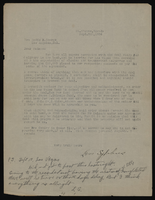
Correspondence, Levi Syphus to Sadie George
Date
Archival Collection
Description
Text
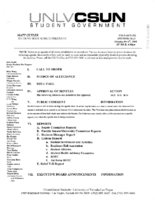
Meeting minutes for Consolidated Student Senate, University of Nevada, Las Vegas, October 06, 2008
Date
Archival Collection
Description
Text
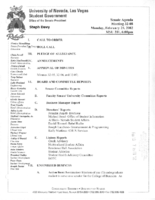
Meeting minutes for Consolidated Student Senate University of Nevada, Las Vegas, February 25, 2002
Date
Archival Collection
Description
Text

Meeting minutes for Consolidated Student Senate, University of Nevada, Las Vegas, March 10, 1981
Date
Archival Collection
Description
Text
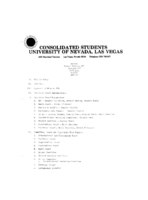
Meeting minutes for Consolidated Student Senate, University of Nevada, Las Vegas, August 03, 1982
Date
Archival Collection
Description
Text
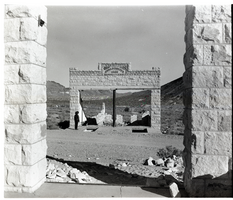
Film transparency of the ruins of the H. D. and L. D. Porter Brothers Store, Rhyolite, Nevada, November 25, 1948
Date
Archival Collection
Description
Image

